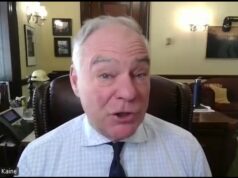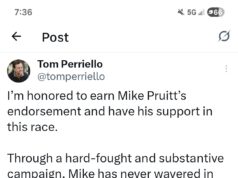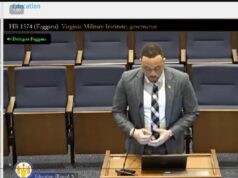
A prophet. I use that word as it applies in the Hebrew Bible. The person may warn us of the future, but that is not his primary task. Rather it is to call us to moral account, to challenge the conventional ways of thinking, to confront those with power and authority about the harm they do to the people and the nation.
Normally I reflect on these words around the anniversary of their being spoken, on an early Spring day.
But as I look around our nation I find that I must keep them before me constantly, partly as a reminder of why I still teach, and why I remain active in trying to make a difference beyond my classroom.
We are still engaged in war. Our economic inequity increases. The levels of hatred and vitriol in our political discourse are as bad as they have been in my lifetime, and I am 64.
I was reminded of these words in reading a book about teaching. That is appropriate.
I share them on a political website. That is even more appropriate. Consider this:
“Those who make peaceful revolution impossible will make violent revolution inevitable.”
Our prophet quoted those words from President John F. Kennedy.
That quote, and the other words I will offer, come from a speech with the title A Time to Break Silence, given April 4, 1967, by Martin Luther King, Jr.
You can follow that link to read the entire text, and/or to listen to King deliver the speech at Riverside Church in New York City.
You can choose to do that, and then reflect upon your own. Then reading the words I will offer after quoting only several paragraphs of that speech might be unnecessary.
I begin immediately after King has quoted Kennedy:
Increasingly, by choice or by accident, this is the role our nation has taken, the role of those who make peaceful revolution impossible by refusing to give up the privileges and the pleasures that come from the immense profits of overseas investments. I am convinced that if we are to get on the right side of the world revolution, we as a nation must undergo a radical revolution of values. We must rapidly begin…we must rapidly begin the shift from a thing-oriented society to a person-oriented society. When machines and computers, profit motives and property rights, are considered more important than people, the giant triplets of racism, extreme materialism, and militarism are incapable of being conquered.
A true revolution of values will soon cause us to question the fairness and justice of many of our past and present policies. On the one hand, we are called to play the Good Samaritan on life’s roadside, but that will be only an initial act. One day we must come to see that the whole Jericho Road must be transformed so that men and women will not be constantly beaten and robbed as they make their journey on life’s highway. True compassion is more than flinging a coin to a beggar. It comes to see that an edifice which produces beggars needs restructuring.
A true revolution of values will soon look uneasily on the glaring contrast of poverty and wealth. With righteous indignation, it will look across the seas and see individual capitalists of the West investing huge sums of money in Asia, Africa, and South America, only to take the profits out with no concern for the social betterment of the countries, and say, “This is not just.” It will look at our alliance with the landed gentry of South America and say, “This is not just.” The Western arrogance of feeling that it has everything to teach others and nothing to learn from them is not just.
A true revolution of values will lay hand on the world order and say of war, “This way of settling differences is not just.” This business of burning human beings with napalm, of filling our nation’s homes with orphans and widows, of injecting poisonous drugs of hate into the veins of peoples normally humane, of sending men home from dark and bloody battlefields physically handicapped and psychologically deranged, cannot be reconciled with wisdom, justice, and love. A nation that continues year after year to spend more money on military defense than on programs of social uplift is approaching spiritual death.
America, the richest and most powerful nation in the world, can well lead the way in this revolution of values. There is nothing except a tragic death wish to prevent us from reordering our priorities so that the pursuit of peace will take precedence over the pursuit of war. There is nothing to keep us from molding a recalcitrant status quo with bruised hands until we have fashioned it into a brotherhood.
You have now read the words upon which I have been reflecting this morning.l
They are, as are the words of most prophets, powerful enough by themselves.
Why then do I find it necessary to add more of my own?
Because I must acknowledge their power by applying them to my own time, to my own life.
Some of King’s words leap off the page at me:
A nation that continues year after year to spend more money on military defense than on programs of social uplift is approaching spiritual death. We have been told this time and again, in so many formulations, certainly since war hero Eisenhower warned us as President of the dangers of continued military spending.
But there is so much more.
A true revolution of values will soon cause us to question the fairness and justice of many of our past and present policies. King spoke especially of our policies with respect to other nations, but those words are equally applicable to our policies at home. At a basic level, the elevation of the profit principle above concerns for individual humans is gross, cannot be justified by anything Jesus said, violates the teaching of the Hebrew prophets, and requires a narrow and distorted reading of our Founding Fathers and our founding documents. As King notes:
A true revolution of values will soon look uneasily on the glaring contrast of poverty and wealth. That contrast exists not only overseas, but is increasing here at home. Then to make it worse, those who benefit from the policies that have enriched them to obscene levels seem to think that the existence of their great wealth entitles them to dictate the shape of public institutions intended to benefit the people as a whole, even if they themselves never participated in those institutions. Bill Gates attempting to define the shape and purpose of American public schools is but the most obvious example of this trend.
The Western arrogance of feeling that it has everything to teach others and nothing to learn from them is not just. This is a particular American failing. It is perhaps part of why we failed in Vietnam. It is also why our economic inequality is increasing while some of our economic “competitors” have taken different paths that have decreased their inequity. It is why even though for those who have the money we can provide the best health care in the world we are well down the list of the best health care systems, even after the actions of the last Congress – still far too many Americans do not have regular affordable access to meet their basic healthcare needs, much less the cases where massive intervention is possible. To have a state such as Arizona be willing to let people needing transplants die when at the same time it will spend several multiples of the moneys needed for those transplants on unnecessary arrest and incarceration of people of Hispanic background to increase the profits of private prison companies is obscene.
A true revolution of values will lay hand on the world order and say of war, “This way of settling differences is not just.” We, the United States of America, are the primary driver of war in the world. We spend more on military than all our allies and enemies combined. We are the world’s largest arms dealers. We constantly are seeking to expand the use of weapons, now of drones run by our intelligence apparatus in the apparent attempt to kill more “terrorist” in Pakistan and elsewhere, even though the track record of innocents killed in the process is horrifying.
Even worse, there are those in this nation, in high office, of both parties, who think it is justified to pervert the rule of law to obtain a predetermined result against those we have decided to label terrorists. Perhaps it is only appropriate that even in some closely allied countries we are hearing warnings that some officials should be careful where they travel lest they be subject to the internationally agreed sanctions against those who commit crimes against humanity, crimes that violate international agreements on things such as torture.
We lost approximately 3,000 people on September 11, 2001. As horrible and shocking as that was, that pales besides the death and destruction we have inflicted elsewhere in supposed retaliation and retribution, much of it in a nation that had nothing to do with the attacks, although the administration in power chose to mislead the people of this nation into that war, and sought to destroy anyone who offered opposition. That we have not held those leaders to account will unfortunately embolden others to act with similar reckless disregard, and more people will suffer, and this nation and the world will be further damaged.
We are just past the anniversary of America’s greatest speech, about which I wrote on its anniversary. How far we are now from the hope that “government of the people, by the people, for the people, shall not perish from the earth.” How little this nation seems to be the last, best hope for mankind as Lincoln also described it.
I wrote yesterday that as I age I find myself becoming more radical. I use the term in the sense of its Latin origin, of wanting to get back to the roots, to not merely deal with the symptoms.
I may not be able to change the course of our nation in my lifetime. I certainly can change my own actions.
Is not the purpose of the words of a prophet to do just that, to challenge us to change what is within our individual powers?
And if enough of us do that, does that not begin to change our nation, from the bottom up?
These are my thoughts today.
I reencountered some of the words of King in a book on education.
I reread the entire speech, reflecting as I did upon the times in which I live.
I thought some more.
I began to write.
If you are still here, you have read the results.
So now what?
What do our individual reflections upon words mean?
Peace?












